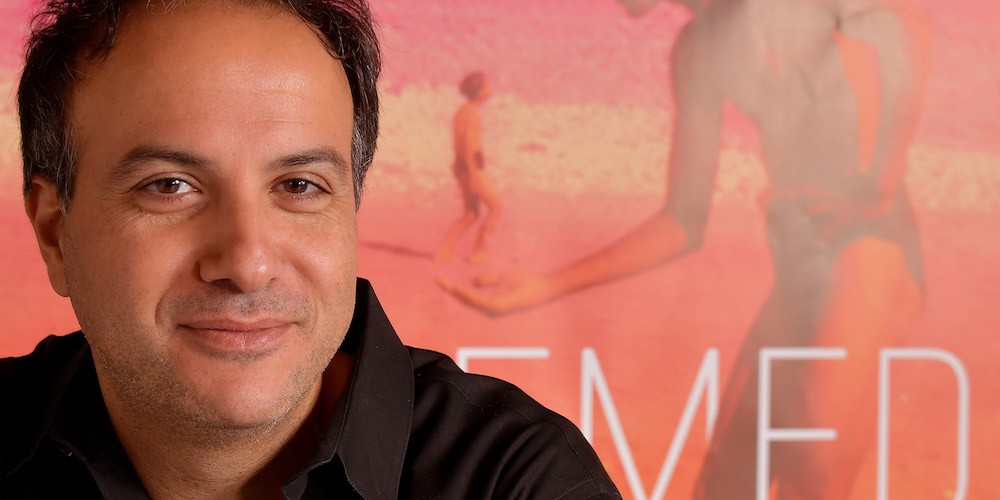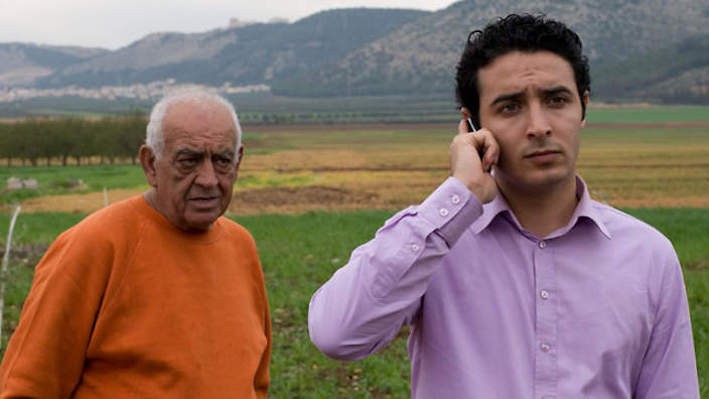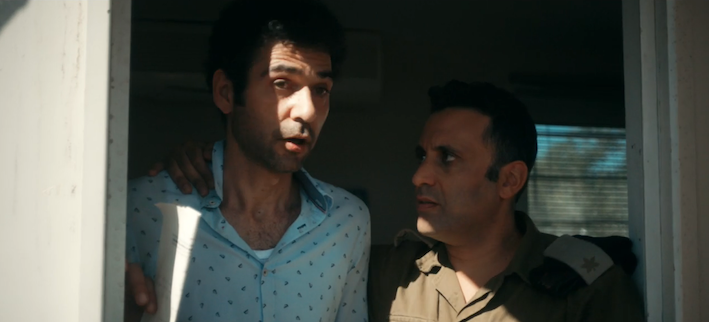On A Global Scale: Sameh Zoabi '05 in Between Comedy and Arthouse
On A Global Scale is a bi-weekly series about international co-productions by Columbia filmmakers.
Welcome to another edition of On A Global Scale. This bi-weekly series celebrates the international spirit of the Columbia University film program and the incredible global collaborations coming out of it.
Two characteristics that describe alumnus Sameh Zoabi '05 are that he likes to finish what he starts and that he doesn’t care much about conventions. So far, these attributes have served the Palestinian filmmaker as he establishs himself as a successful director on the international film market. Zoabi’s work has been shown in many international film festivals such as Cannes, Berlin, Locarno, Sundance, Karlovy Vary, and the New York Film Festival. A selection of Zoabi’s notable work includes his Columbia thesis short Be Quiet (2005), which received a prize at the Cannes Film Festival in the Cinefondation Selection. His feature film debut, Man Without a Cell Phone (2010), won several audience awards as well as the Golden Antigone at the 2011 Montpellier Film Festival. And most recently, Zoabi, who is also a full time faculty member at NYU Tisch, premiered his feature film, Tel Aviv On Fire (2018), which he co-wrote with Special Lecturer Dan Kleinman, at Toronto Film Festival and the 75th Venice International Film Festival.
But it was a long journey for Zoabi to get to this point. He grew up in a small village called Iksal outside of Nazareth, where there was no conventional way of getting into the film industry. “I was an achieving student in a small town, but I thought there was something bigger out there. My presentation in 10th grade was on Elvis Presley and his music. I always had an eye on the West in this small town. I wasn’t an outsider, but I was interested in different things than most others. But I was the youngest of nine kids, my father is a farmer, only one of my brothers went to school. And it was expected from the most achieving student to go into law or medicine. But something drew me to film and TV,” Zoabi says. “It sounds like a million years ago but right before phones and the internet came around, we had less access to the world outside. I didn’t even know what New York was. I hadn’t been to a theatre. I only watched a few movies on VHS like Rambo, Chuck Norris films and films from the 90’s. And then I took a leap of faith and said: Let’s try it out! Zoabi received a prestigious Fulbright scholarship to pursue his MFA in Film at Columbia with a clear ambition in mind. “I wanted to learn how to write narrative films. Many documentaries were made about the Palestinian/Israeli issue and I wanted to do something different. Columbia’s focus was on working with actors and creating a narrative. I arrived without any technical background as a blank page with nothing but excitement to be there. It forged my career the way it did. I was more concerned with the narrative without paying attention to the glossy, visual effects movies.” This approach hasn’t changed much to this day for Zoabi. “I still give my DP [director of photography] a lot of liberty on how the film looks. I have ideas but I don’t know what filters, what lenses, what lighting to use. All of this is still gibberish to me. And I like that.”
However, looking back, Zoabi’s time at Columbia also came with a lot of challenges. “When I was about to make my thesis film, I said to myself: Once I’m done, I’m going to do something else. It was so hard to finalize my film, I missed all the Columbia grants and was rejected three times. Politically, nobody wanted to deal with Palestinians post 9/11. It felt like nobody wanted to hear our stories.” But luckily, Zoabi had this urge to finish what he started and prevailed long enough for his short Be Quiet to be accepted into Cannes where it also won an award. “I got the taste for the responsibility that came with it. And I thought: I can’t stop now. So here I am, still making movies.”
But this is where Zoabi once again went against conventions. Because while his short was a drama, he had no intention of making a dramatic film as a first feature. What he really wanted to do was comedy. So he directed Man Without a Cell Phone, a comedy that is now also the inspiration for a new TV show Zoabi is working on. The film won numerous awards despite not making it to the “big” festivals as Zoabi recounts. But he felt that he was on the right track—finding his voice—and he wanted to follow it up with another comedy set in Gaza. That’s when he discovered the difficulties of working in comedy. “The feedback from the world market in Cannes and Sundance was that it’s not strong enough. And I never understood what that means. Later on, I realized it means that comedy has lightness to it that does not give you the feeling of heaviness an arthouse movie gives you. Sadly, there is this interpretation from people who run the big festivals which have become essential nowadays to forge your career. So, I was rejected on the basis of what people think Gaza should look like. People said you can’t do comedy in Gaza. There are no happy endings from there.” However, Zoabi was unwavering. He stayed on this path. “Knowing where I come from is not represented in cinema or the media in the right temperature keeps me going,” he says. “It’s either too hot with the war or too low that it feels fake. There’s a zone of the reality of people in Palestine and the Middle East that I wanted to capture to give the story an universal appeal. It doesn’t feel natural to keep talking about your misery. That’s my inner engine at this point. But can international films with a political subject live in a world that’s not just arthouse?”
Zoabi answered this question for himself with his next and most recent film, the much-acclaimed Tel Aviv on Fire – his most personal film to date. In the film, an inexperienced young Palestinian man becomes a writer on a popular soap opera after a chance meeting with an Israeli soldier. His creative career is on the rise, until the soldier and the show's financial backers disagree about how the show should end, and he is caught in the middle.
“I was writing about the dilemma of what people expected from me and my scripts,” Zoabi says. “The way we make movies over there is still through co-productions and being Palestinian working with Israeli producers, taking money from Israel and Europe – you have to have the balance where everybody wants something from you. But the audience wants something different.”
At the Venice Film Festival, Tel Aviv on Fire won the Orrizonti Award for Best Actor, an unusual feat for a comedy. What makes the movie successful? Zoabi thinks he knows the answer. “I feel the more specific you are, not about the cultural nuances, but the more specific the character, the more universal it becomes. The cultural specificity will live within the character. I see a lot of young filmmakers say: ‘Oh, my line isn’t working because no one will understand the culture.’ And then they have hang-ups because it’s hard to translate; they try to explain the joke and it doesn’t work. But what’s always most universal in these stories is the character – we are all the same around the world with the same basic human needs. In Tel Aviv on Fire what’s specific about my character is not that he’s Palestinian or that he has to go through checkpoints. What makes him universal is the basic need to want to succeed. The film works because you meet a guy at the bottom, who is all over the place, he’s in debt. Suddenly, he comes into a situation where he has to commit to something he doesn’t even control. Then the political reality and the culture live with the character. But I don’t write my character to fit the reality. The reality will fit to the need of the character.”
For Zoabi, Tel Aviv on Fire was a breakthrough in terms of finding his voice as an artist. When asked how he manages to make comedic films on the international film market, Sameh Zoabi sighs heavily and laughs. “That’s adding salt to my wound. It’s not easy to make the films I’m making right now. With comedy the likelihood is your film will have a happy ending. You can’t end it in tragedy. But happy endings for arthouse cinema are not good.” In general, Zoabi sees hesitance from funding resources towards comedies. “There is arthouse and there is commercial. Commercial means it’s not deep enough, not strong enough. And arthouse is more heartfelt, an auteur film, painted with blood and suffering of the filmmaker. The problem for me is I want to live in the world in between. To be a little arthouse and a little commercial.”
Tel Aviv on Fire lives in this very space. “I never defined my films as comedies,” Zoabi says. “It’s always about stories that excite me. I always have to find the thing in a story that is real enough but elevated slightly above reality. My films are funny, but they’re real. With reality you can get the depth of character and vulnerability, but I’m looking for a zone of playfulness. It excites me, I can’t think in very dramatic terms. I try, but it doesn’t work.”
After the success of Tel Aviv on Fire, Zoabi is working on multiple projects in both TV and film at once, his goal a more elaborate and complex inbetween zone. He’s remaking Tel Aviv on Fire as a TV show set on the US/Mexico border. “I’m also currently writing a feature on a story that happened during the pandemic called Hotel Corona. It’s inspired by a story that came out in Jerusalem where they put Jews and Arabs in one hotel. All the people were sick with Corona and couldn’t leave. I’m writing a comedy about that.” And then there’s of course still his comedy about Gaza, Catch the Moon, the project that was once considered ‘not strong enough.’ “Gaza is under siege and death and destruction is everywhere,” Zoabi says. “My story is about a guy who wants to get married and he promises his soon-to-be wife’s family a car. And finding a car in Gaza is Mission Impossible. So anything that could go wrong becomes by nature funny because it’s so real. How could that be possible?”


